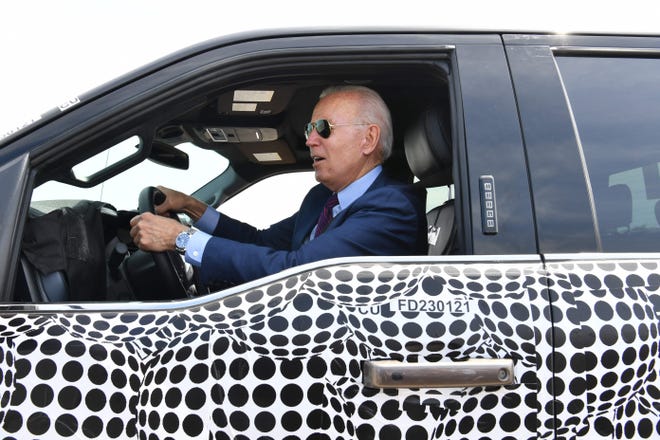
WASHINGTON – President Joe Biden said "there's no turning back" on the future of an electric auto industry Thursday as he signed an executive order setting a target for zero-emissions vehicles to account for half of all automobiles sold in the U.S. by 2030.
The non-binding goal hinges on major investments by the federal government in charging stations and other infrastructure.
It’s part a series of actions Biden announced aimed at jump-starting a dramatic shift toward electric vehicles as part of the administration's broader agenda to tackle climate change and compete with China, a leader in the electric vehicle market.
The president, with zero-emissions vehicles staged behind him on the White House South Lawn, was joined by executives from Ford, GM and Stellantis as well as leaders from the United Auto Workers union and members of Congress.
"The question is whether we’ll lead or fall behind in the race for the future," he said before signing the order. "Right now, China's leading the race as one of the largest and fastest growing electric vehicle markets in the world."
Biden said his administration will develop long-term fuel efficiency and emissions standards that would apply to heavy-duty vehicles in addition to cars, SUVs and pickup trucks, officials said. The Environmental Protection Agency also announced they're unwinding former President Donald Trump's rollback of near-term fuel efficiency and emissions standards for gas vehicles.
More:Who really needs an electric car with 500 miles of battery range? Nobody or maybe everyone

The White House estimated the new EPA rules would save around 200 billion gallons of gasoline and reduce 2 billion metric tons of carbon pollution, resulting in $900 in savings for consumers over a vehicle lifespan. Officials said the fuel efficiency and emissions standards would result in about $140 billion in net benefits over the life of the program.
The new executive order applies to battery electric, plug-in hybrid electric and fuel-cell electric vehicles. According to the Pew Research Center, electric vehicles accounted for less than 2% of U.S. automobile sales in each of the past three years, putting the U.S. behind 19 other nations and the world's overall share.China has more than double the amount of electric vehicles on the road and is growing electric vehicle sales at more than twice the rate compared to the U.S., according to Pew.
"The rest of the world is moving ahead. We just got to step up," Biden said.
More:Biden pushes U.S. electric vehicle revolution — a sticking point in GOP infrastructure talks
The standards come as Biden has made electric vehicles a major priority in his $1.2 trillion bipartisan infrastructure bill that the Senate is taking up this week. The proposal includes $7.5 billion in electrical vehicle charging stations and another $7.5 billion for electric buses. It would also allocate $6 billion in battery supply chain and battery-pack manufacturing and helping factories expand capacity to produce electric vehicles.
Biden said his order is intended to "set into motion an all-out effort" to shift to electric vehicles, adding that auto companies need help from the federal government though his infrastructure proposals to reach its zero-emissions goals.
“That's a big deal, but to unlock the full potential, we have to keep investing in our workers and our manufacturing capacity.”
Separate from the White House announcement, auto companies unveiled their own goals to achieve sales between 40 and 50% of annual U.S. volumes in electric vehicles for 2030. BMW, Volkswagen, Honda and Volvo also said they supported the move to expand U.S. electric vehicle manufacturing.
The United Auto Workers expressed support for Biden's initiative but added the organization's "focus is not on hard deadlines or percentages, but on preserving the wages and benefits that have been the heart and soul of the American middle class."

But some environmental groups were less enthused about the voluntary measures. Dan Becker, director of the Safe Climate Transport Campaign at the Center for Biological Diversity said Biden's rules do not amount to the standard former President Barack Obama negotiated with car companies nine years ago.
Obama-rules mandated 5% annual increases in fuel economy and emissions standards, targets that Trump rolled back to 1.5%.
"Biden must reimpose the genuine Obama standard and use it to launch far stronger long-term emissions rules," Becker said. "We urgently need to cut greenhouse gas pollution to have a chance at a livable planet, and voluntary measures won’t cut it.”
The president has set a goal of reducing net greenhouse gas emissions by 50-52% below 2005 levels by 2030. Officials estimate the latest announcements put the U.S. on track to reduce greenhouse gas emissions from new passenger vehicle sales by more than 60% in 2030 compared to vehicles sold last year.
Reach Joey Garrison on Twitter @joeygarrison and Courtney Subramanian @cmsub.
Source link





